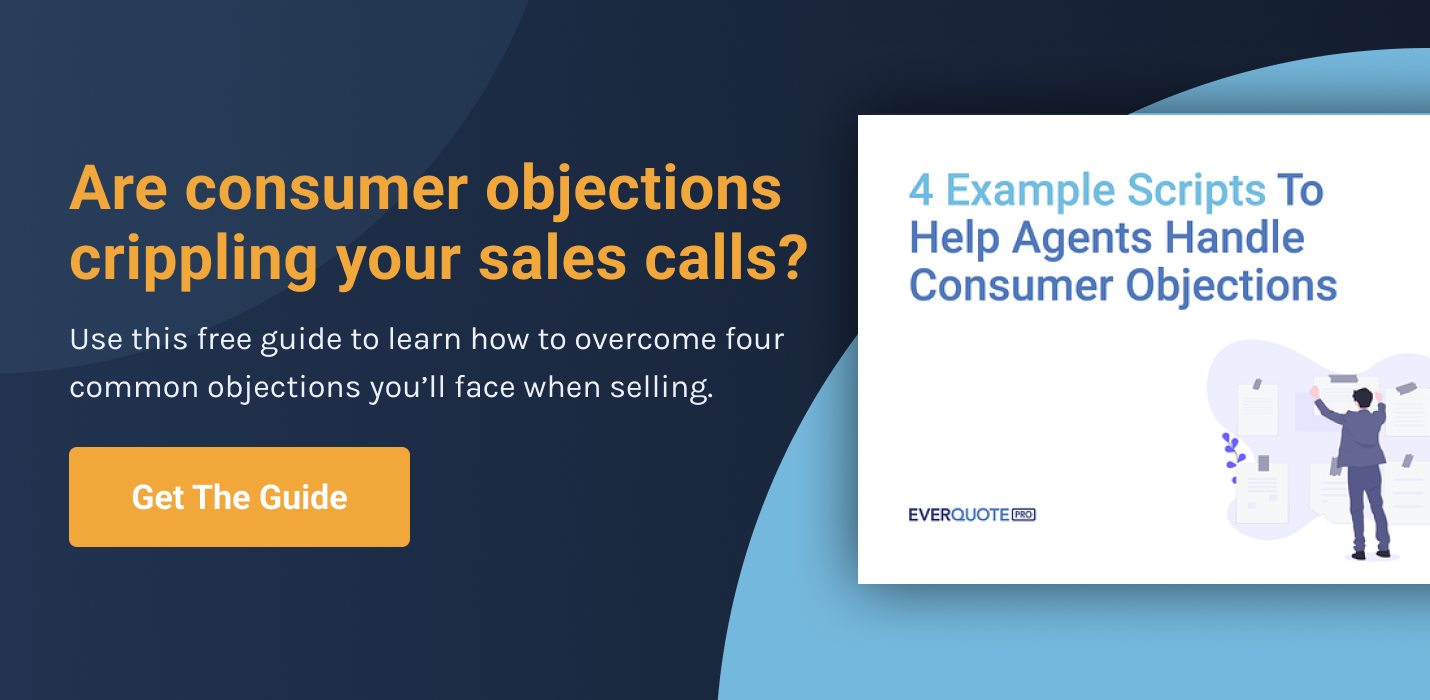- Home»
- EverQuote Pro Blog»
- The Secret To Being Successful In Insurance Sales [Hint: It's Not What You Think]
The Secret To Being Successful In Insurance Sales [Hint: It's Not What You Think]

Are you and your producers tired of spinning your wheels with internet leads? Maybe you’re not converting on leads; or your contact rates, quote rates, and bind rates are too low. Whatever your specific problem is, you’re frustrated, because you know you can sell (your policy bind rate with referrals is proof!).
So what gives? How can you be doing well with referrals, but tanking when it comes to internet-based insurance leads?
The problem is, selling insurance via referrals and selling it through internet-based leads are two separate processes. Many agents treat them as the same thing—and you can’t; they are two separate beasts. To be successful in insurance sales, you have to learn how to work both types of leads. When you master the art of selling to both internet leads and referrals, you can be wildly successful with both.
You can’t treat referrals the same way you treat internet leads.
How To Be Successful In Insurance Sales Using Internet Leads
To be successful with internet-based leads, you need to first define your agency’s selling strategy, then follow it consistently—for every single lead you touch.
Our most successful agents take every internet lead we send them and do the following things:
1. They (or someone on their team) call a lead as soon as they receive it.
The most successful agents call a lead as soon as the information hits their inboxes. Speed-to-dial is crucial for success when using insurance leads, because the first person to call out has the best chance to get the lead on the phone first (and thus the highest likelihood for success). Your goal: Dial out to the lead within 10-20 seconds of receiving the information.
2. They call as many times as it takes to get them on the phone.
You probably won’t get your lead on the phone the first time you attempt to call. But it’s imperative that you be persistent.
Because so many agents build up their businesses on referrals, they are used to how the referrals sales process works. When you call a referral, that person is expecting to hear from you, and you already have a high chance to convert them into a customer.
Internet leads, on the other hand, are not expecting your call. Just because the lead requested information online doesn’t mean they’ll be waiting to hear from you. As a rule, you will almost always need to call them multiple times in order to be successful.
3. They develop sophisticated call cadences.
Now you need a good strategy to handle all that calling. That means setting up a strategic call cadence for internet leads.
We recommend calling 2-3 times the first day. After your first call, follow up 30 minutes later. If you don’t get in touch then, follow up again at the end of the day. We recommend calling an additional 3-5 times after the first day. When all is said and done, it’s preferable to call 6-8 times in total.
Don’t Give Up!
You may feel down and out with your internet lead success rate compared to your “normal” success rate working a referral, but you’re not alone—all agents struggle more with internet leads. But by using these three strategies, you can increase your success rate across the board.
One final tip: If you’re looking for high-quality internet leads, you don’t want to partner with just any leads company. EverQuote guarantees lead information that isn’t recycled, aggregated, or old. Let’s chat about how we can help you increase your success in insurance sales today!
Unlock predictable growth with EverQuote.
Our representatives are standing by to help you succeed.
Call 844-707-8800
Weekdays, 9AM-5PM (ET)
Call 844-707-8800
Weekdays, 9AM-5PM (ET)
Accelerate your growth.
Complete the form below or just call 844-707-8800 to learn how we can help you achieve your goals.
By clicking "Get Started", I consent by electronic signature to being contacted by EverQuote, including by automatic telephone dialing and/or an artificial or prerecorded voice (including SMS and MMS - charges may apply), regarding EverQuote for Agents, even if my phone number is listed on a Do Not Call Registry. I also understand that my agreement to be contacted is not a condition of purchasing any goods or services, and that I may call (844) 707-8800 to speak with someone about EverQuote for Agents.
By clicking "Get Started", I affirm that I have read and agree to this website’s Privacy Policy and Terms of Use, including the arbitration provision and the E-SIGN Consent.
* Mandatory fields
 Product Overview
Product Overview Blog
Blog FAQs
FAQs Webinars
Webinars eBooks & Resources
eBooks & Resources